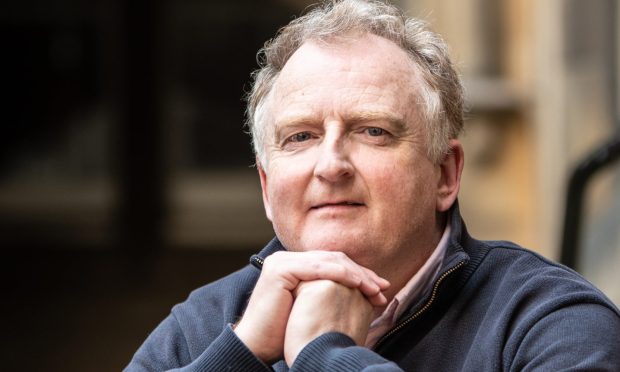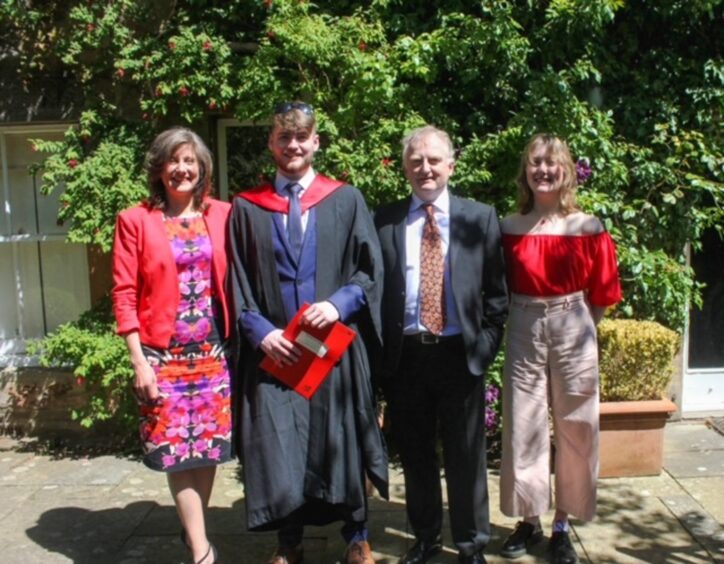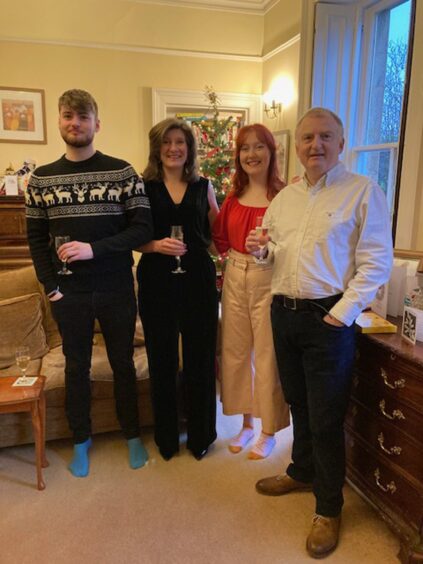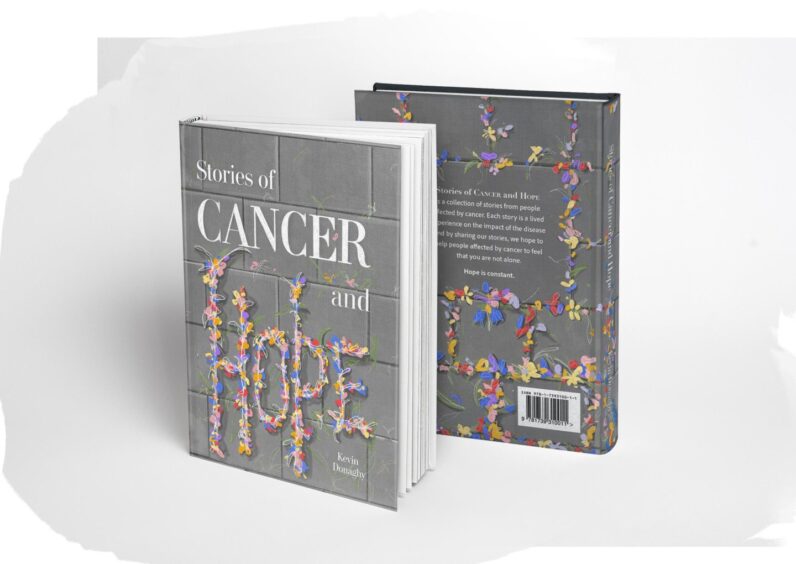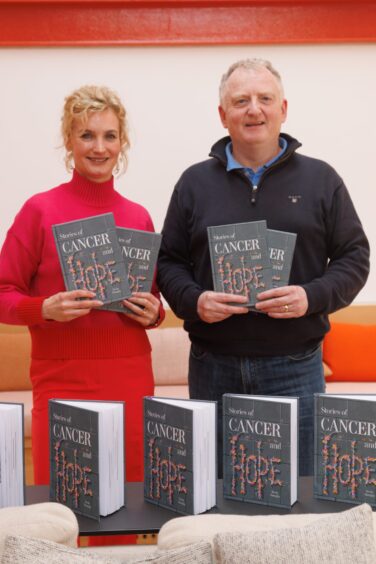Aberdeen FC fan Kevin Donaghy could be considered an expert on hope.
The 54-year-old has put together a book, Stories of Cancer and Hope, in which cancer patients talk about their experiences with the disease.
More importantly, however, Kevin has stage four incurable melanoma cancer, a type of skin cancer.
On December 2019, two weeks before Christmas, he was given just nine to twelve months to live.
Hope, therefore, is something he’s thought about a lot.
“[When I first got ill] I knew there was something wrong, but I hoped it wasn’t cancer,” he explains. “And then when I was told it was cancer, I hoped it wasn’t terminal. I hoped that it was treatable.”
That didn’t happen. But Kevin’s hopes then transferred to an experimental treatment that has extended his life.
With that comes new ambitions, smaller in scale but just as important.
To spend as much time as he can with his wife and two children, for example. To live to see his beloved Aberdeen FC win another trophy.
“The interesting thing about hope is, it is always there,” Kevin says. “Hope is constant. But hope can change as well.”
A collapse on the streets of Edinburgh
In 2018, Kevin was walking through Edinburgh city centre when he got a phone call.
A few weeks earlier the IT consultant from Melrose had had a stage two melanoma removed from his left forearm, and a doctor was calling to give him the good news that the cancer hadn’t spread.
“I collapsed in the middle of Princes Street,” he recalls.
He says he hadn’t cried like that since his children were born. “I just couldn’t control the tears, the immense wave of relief that came over me.”
Kevin’s cancer returns, and the news is not good
The relief lasted just 18 months. In Manchester on business for his IT consultancy, Kevin felt an acute pain in his back.
“The pain was so severe, I ended up calling treble one,” he says. “I was given some pain relief, but in the back of my mind, I was thinking, is this something to do with my cancer?”
Tests were carried out, and eventually – on Friday the 13th, Kevin vividly recalls – an oncologist tells him he has stage four metastatic melanoma, which is life-limiting and incurable.
“The walls came tumbling down from that moment in my life,” says Kevin.
Kevin prepares for a last Christmas with the family
As someone who works in IT, however, Kevin is a fairly analytical guy.
He also says his support of the Dons over the past four decades, starting when he visited his sister in Aberdeen as a young man, makes him a staunch realist.
“The unfortunate statistics of that type of cancer was there was only a 40% chance that any treatment would prolong my life,” he says. “And if not, I may have nine to twelve months before I died.”
His chat with the oncologist was in the middle of December 2019, so together with his wife Sophie they prepared for what they thought would be one last Christmas.
They held off telling their two children, Stephen and Katherine, who at that time were 16 and 19, until after the holidays. Kevin says it was a tough decision but his memories of that day prove it was the right one.
“I didn’t want the day to end,” he says. “It was incredibly special.”
‘That was my real blinding moment’
The new year brought some difficult moments for Kevin. But a chance conversation in 2020 was to change his life.
Kevin wasn’t undergoing chemotherapy for his cancer, instead he was receiving a new kind of treatment called immunotherapy.
Talking to a business associate one day, he discovered the client had a brother in Australia who was an expert in the field.
“The light turned on in the room,” Kevin says of that moment. “Just by sharing my journey, I was introduced to [the expert]. That was my real blinding moment.”
How Kevin Donaghy came to write Stories of Cancer and Hope
Kevin’s cancer remains incurable, but the success of the immunotherapy allowed him to look further ahead than he previously dared.
Remembering his own struggles with depression before his treatment started working, he wondered if there was something he could do for others on the same path.
He recalled something else, too – the support and solace he got from the online melanoma cancer community where for the first time Kevin felt able to share his struggles.
“Suddenly, I had found my people,” he says. “And that’s where the idea for the book came from because I felt so much better sharing my story with people who understood.”
Stories of Cancer and Hope released as an ebook
Stories of Cancer and Hope shares the experiences of 39 cancer patients from across the UK including Labour MP Chris Bryant and Nicola Nuttall, mother of brain cancer campaigner Laura Nuttall.
Some of Kevin’s friends are in there, too, including Ricky Nicol, from Edinburgh, who co-founded Commsworld in the 1990s, before being diagnosed with throat cancer.
A print version of the book was released in May, paid for by donations and distributed free to cancer charities and treatment centres.
On Tuesday January 2, Stories of Cancer and Hope was released as an e-book after Kevin teamed up with cancer charity Maggie’s, which will get all profits made from the book.
The aim, says Kevin, is for patients at centres such as Aberdeen Royal Infirmary or Raigmore Hospital to have access to the book – and know that they are not alone.
“I know the fear, the isolation, the loneliness that I went through, especially when you’re first diagnosed,” Kevin explains. “I thought, there has to be some way I can help people to feel that they’re not alone, that there is hope whatever that hope looks like.”
Not every story has a happy ending
Though it is the common thread of the book, Kevin is aware that hope is not enough on its own.
A handful of the 39 stories end with an afterword from a close relative or friend because the authors are no longer around to tell it themselves. Despite the many advances in cancer treatment, the disease still takes a heavy toll.
“We couldn’t have everyone having a happy ending, because that is just not the reality,” says Kevin.
What continues to be needed, Kevin says, are the ongoing efforts to eradicate the disease. Of the hopes he has held close since his diagnosis, this is one that hasn’t changed.
“My greatest hope,” he says, “is that someone reading this book in fifty, eighty or a hundred years’ time might ask, ‘Did people used to die of cancer?’”
Stories of Cancer and Hope is available to buy here.
